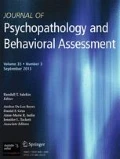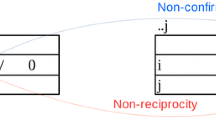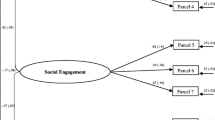Abstract
The concurrent and predictive validity of four qualitative behavioral classes of social interaction (initiating and receiving positive and negative social interaction) was investigated using sociometric measures of peer acceptance (ratings) and friendship (nominations). Correlational analyses showed significant relationships between behavioral and sociometric measures supporting previous work with preschool populations. Stepwise multiple regression analyses suggested that receiving social interaction from peers best predicted overall acceptance, whereas initiating social interactions best predicted children's friendship patterns. Tentative implications for the behavioral assessment of children's social skills were discussed.
Similar content being viewed by others
References
Asher, S. R., and Hymel, S. Children's social competence in peer relations: Sociometric and behavioral assessment. In J. D. Wine and M. D. Smye (Eds.),Social competence. New York: Guilford Press, 1981.
Bellack, A. S., and Hersen, M. (Eds.).Research and practice in social skills training. New York: Plenum Press, 1979.
Bolstad, O. D., and Johnson, S. M. Self-regulation in the modification of disruptive classroom behavior.Journal of Applied Behavior Analysis 1972,5 443–454.
Cartledge, G., and Milburn, J. F. The case for teaching social skills in the classroom.Review of Educational Research 1978,48 133–156.
Cartledge, G., and Milburn, J. F. (Eds.).Teaching social skills to children: Innovative approaches. New York: Pergamon Press, 1980.
Charlesworth, R., and Hartup, W. W. Positive social reinforcement in the nursery school peer group.Child Development 1967,38 993–1002.
Combs, M. L., and Slaby, D. A. Social skills training with children. In B. B. Lahey and A. E. Kazdin (Eds.),Advances in Clinical Child Psychology, Vol. 1. New York: Plenum Press, 1977.
Evers, W. L., and Schwarz, J. C. Modifying social withdrawal in preschoolers: The effects of filmed modeling and teacher praise.Journal of Abnormal Child Psychology 1973,1 248–256.
Foster, S. L., and Ritchey, W. L. Issues in the assessment of social competence in children.Journal of Applied Behavior Analysis 1979,12 625–638.
Gottman, J. M. Toward a definition of social isolation in children.Child Development 1977,48 513–517.
Gottman, J. M., Gonso, J., and Rasmussen, B. Social interaction, social competence, and friendship in children.Child Development 1975,46 709–718.
Gottman, J. M., Gonso, J., and Schuler, P. Teaching social skills to isolated children.Journal of Abnormal Child Psychology 1976,4 179–197.
Green, K. D., and Forehand, R. Assessment of children's social skills: A review of methods.Journal of Behavioral Assessment 1980,2 143–157.
Green, K. D., Forehand, R., Beck, S. J. and Vosk, B.Child Development 1980,51 1149–1156.
Greenwood, C. R., Walker, H. M., and Hops, H. Issues in social interaction/withdrawal assessment.Exceptional Children 1977,43 490–499.
Gresham, F. M. Social skills training with handicapped children: A review.Review of Educational Research 1981a,51 139–176.
Gresham, F. M. Assessment of children's social skills.Journal of School Psychology 1981b,19 120–133
Gresham, F. M. Validity of social skills measures for assessing social competence in lowstatus children: A multivariate investigation.Developmental Psychology 1981c,17 390–398.
Gresham, F. M.Social skills training with children and adolescents Unpublished manuscript. Baton Rouge: Louisiana State University, 1981d.
Gresham, F. M., and Nagle, R. J. Social skills training with children: Responsiveness to modeling and coaching as a function of peer orientation.Journal of Consulting and Clinical Psychology 1980,48 718–729.
Hartup, W. W., Glazer, J. A., and Charlesworth, R. Peer reinforcement and sociometric status.Child Development 1967,38 1017–1024.
Hymel, S., and Asher, S. R.Assessment and training of isolated children's skills. Paper presented at the meeting of the Society for Research in Child Development, New Orleans, 1977 (ERIC Document Reproduction Service No. ED 136-930).
Keller, M. F., and Carlson, P. M. The use of symbolic modeling to promote social skills in preschool children with low levels of social responsiveness.Child Development 1974,45 912–919.
La Greca, A. M., and Santogrossi, D. A. Social skills training with elementary school students: A behavioral group approach.Journal of Consulting and Clinical Psychology 1980,48 220–227.
Milburn, J. F.Special education and regular class teacher attitudes regarding social behaviors of children: Steps toward the development of a social skills curriculum Unpublished doctoral dissertation. Columbus: The Ohio State University, 1974.
O'Connor, R. D. Modification of social withdrawal through symbolic modeling.Journal of Applied Behavior Analysis 1969,2 15–22.
O'Connor, R. D. Relative effects of modeling, shaping, and the combined procedures for modification of social withdrawal.Journal of Abnormal Psychology 1972,79 327–334.
Oden, S., and Asher, S. R. Coaching children in social skills for friendship making.Child Development 1977,48 495–506.
Rathjen, D. P., and Foreyt, J. P.Social competence: Interventions for children and adults. New York: Pergamon Press, 1980.
Reardon, R. C., Hersen, M., Bellack, A. S., and Foley, J. M.Measuring social skill in grade school boys Unpublished manuscript. Pittsburgh: University of Pittsburgh, 1978.
Romano, J. M., and Bellack, A. S. Social validation of a component model of assertive behavior.Journal of Consulting and Clinical Psychology 1980,48 478–490.
Singleton, L. C. and Asher, S. R. Peer preferences and social interaction among third-grade children in an integrated school district.Journal of Educational Psychology 1977,69 330–336.
Spence, S. H. Validation of social skills of adolescent males in an interview conversation with a previously unknown adult.Journal of Applied Behavior Analysis 1981,14 159–168.
Statistical Analysis System Institute.Statistical Analysis System user's guide. Raleigh, N.C.: SAS Institute, 1979.
Stodden, V. A.The factor structure and discriminant validity of Social Behavior Assessment for emotionally disabled and normal students Unpublished specialist thesis. Ames: Iowa State University, 1981.
Thomson, C., Holmberg, M., and Baer, D. M. A brief report on a comparison of time sampling procedure.Journal of Applied Behavior Analysis 1974,7 623–626.
Van Hasselt, V. B., Hersen, M., Whitehill, M. B., and Bellack, A. S. Social skill assessment and training for children: An evaluation review.Behavior Research and Therapy 1979,17 413–437.
Van Houten, R. Social validation: The evolution of standards of competency for target behaviors.Journal of Applied Behavior Analysis 1979,12 581–591.
Wolf, M. M. Social validity: The case for subjective measurement or how behavior analysis is finding its heart.Journal of Applied Behavior Analysis 1978,11 203–214.
Author information
Authors and Affiliations
Additional information
The current data were gathered as part of a larger research project concerning social skills assessment and training in children.
Rights and permissions
About this article
Cite this article
Gresham, F.M. Social interactions as predictors of children's likability and friendship patterns: A multiple regression analysis. Journal of Behavioral Assessment 4, 39–54 (1982). https://doi.org/10.1007/BF01321381
Accepted:
Issue Date:
DOI: https://doi.org/10.1007/BF01321381




